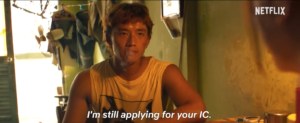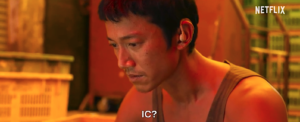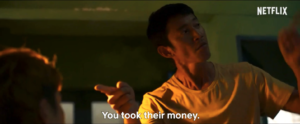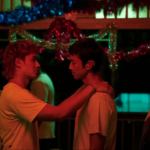
By Robert St. Martin
Los Angeles, Ca (The Hollywood Times) 11/25/24 – At the recent Asian World Film Festival in Los Angeles, the jury chose the Malaysian film Abang Adik as the Best Film – yet another honor for first-time director and former music and film producer Jing Ong. The post-pandemic trend of reflecting about family bonds, makeshift families, broken families, and their relevance in our lives has undoubtedly flavored Abang Adik is no exception. The film follows the lives of two young men, Abang (Wu Kang-Ren) and his brother Adik (Jack Tan), in Pudu Pasar, the run-down market district of Kuala Lumpur. This film is worth seeing and available on Netflix.
 A harsh social commentary is at the heart of Abang Adik and particularly effective is the parallel between immigrants and the lives of the two young men who, despite being Malaysian but without documents, are relegated to the same life of fear and uncertainty; they are invisible people, hidden in the crevices of an indifferent society. “Abang Adik” (literally, older brother and younger brother in Malay language) starts as a slice-of-life in the slums of Kuala Lumpur and just before deviating into poverty-porn, it surprisingly converts into a noir and a thriller with tones of melodrama. Fortunately, this powerful film managed to get past the fussy Malaysian censors.
A harsh social commentary is at the heart of Abang Adik and particularly effective is the parallel between immigrants and the lives of the two young men who, despite being Malaysian but without documents, are relegated to the same life of fear and uncertainty; they are invisible people, hidden in the crevices of an indifferent society. “Abang Adik” (literally, older brother and younger brother in Malay language) starts as a slice-of-life in the slums of Kuala Lumpur and just before deviating into poverty-porn, it surprisingly converts into a noir and a thriller with tones of melodrama. Fortunately, this powerful film managed to get past the fussy Malaysian censors.
Events mostly occur in the Pasar Pudu district, which is known for its wet markets but also houses multiple nationalities who exist below the poverty line. A shockingly harsh opening sequence shows Adik in the middle of a migrant smuggling operation where he is acting as a middleman for a shady boss. The operation goes horribly wrong, costing the life of a man and leaving Adi free from police attention, but not from the furious migrants that had paid him for nothing. His brother Abang though, is the polar opposite of Adi. Deaf and mute from birth, he is a fundamentally honest person, resigned to the life of poverty that fate has assigned to him, and determined to live a decent life through his work. On the contrary, Adik is angry and refuses to accept his destiny; he wants money and is prepared to obtain it in any illegal way, even selling his body. Their bond is strong as they only have each other; Adik always gets into trouble and Abang is always there for him.

Aging transgender prostitute Money, who lives in the same council block, has been a sort of mother for them in recent times, sharing a bit of love with the two invisible brothers. Invisible indeed, as being orphans and undocumented, they are in no better position than any migrant, despite their true Malaysian nationality. Abang is trying to obtain a regular ID card with the help of a dedicated social worker, Jia En, while Adik is planning to buy a fake one once he’s made enough money, but a dramatic accident puts in serious jeopardy their hope for an escape of any sort.
Ong is quick to establish a palpable sense of verisimilitude by opening with an intense sequence which depicts Adik serving as Kamarul’s representative in a human smuggling deal which goes south when the police turn up. The assembled migrants are certainly the most exploited in this nefarious arrangement, but the pressure clearly felt by Adik and his contact immediately conveys a world where everyone is getting by at various levels of illegality. This sequence and a subsequent tenement raid by the authorities fuse on-the-fly documentary practice with a dexterous navigation of urban topography, Indian cinematographer Kartik Vijay breathlessly illustrating how society’s invisibles are essentially trapped by the very dilapidated structures that they seek refuge in.

Often clothed in scruffy T-shirts emblazoned with the names of other places (London, Brooklyn), Tan nails Adik’s rebellious streak and yearning for escape; Wu’s simply astonishing performance as a deaf-mute is a delicate slow burn which culminates in a searing monologue delivered convincingly in sign language.
Director Ong places his symbiotic brothers in a metropolis where the fringes of humanity struggle to find an identity. However, their personalities, in the course of the story, become increasingly strong and deeply touching, creating two characters worth caring about. Simple gestures and rituals, like the habit of cracking boiled eggs on each other forehead show the bond and the habits formed by growing up together and sharing everything. In a short episode in the second half, Abang risks to get irreparably lost because of his disability but it doesn’t happen because of the brothers’ almost telepathic connection. Later we discover the real reason. A complete three-act piece – intro, shock, and relief – a 2-minute film within the film, about natural connections.

However, when the plot gets thicker, the interaction between the brothers acquires a whole lot of complex psychological facets, exploring their emotional dependence – as they are to some degree dependent on each other – and the painful yet inevitable process of separation. As tragic inevitability takes hold, the beautifully synchronized lead performances ensure that Ong’s plea for a fairer Malaysian society comes with profound resonance.

